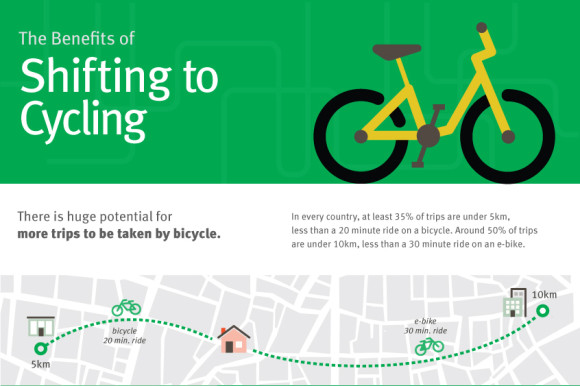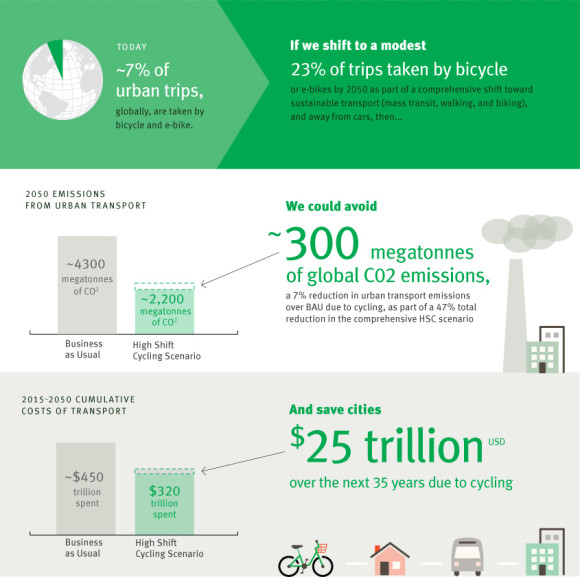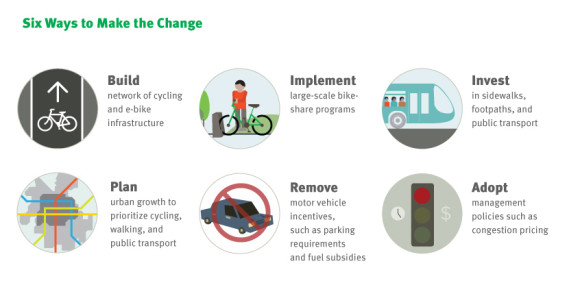
A Global High Shift Cycling Scenario: Cycling could save cities $25 trillion and 10% of transport CO2 emissions by 2050
The incredible potential of dramatically increasing cycling is captured for the first time in a scientific study carried out by ITDP and UC Davis. A Global High Shift Cycling Scenario shows that cycling and e-biking can cut energy use and CO2 emissions of urban transport by up to 10% by 2050 compared to current estimations, while saving society trillions of dollars.
This is the first report that quantifies the potential CO2 and cost savings associated with a world-wide shift toward much greater use of cycling in urban areas
Said report co-author Lew Fulton, co-director of the STEPS Program within the Institute of Transportation Studies at the University of California, Davis.
“The estimated impacts surprised me because they are so large. The costs saved in lower energy use and reducing the need for car travel, new roads, and parking lots through 2050 are substantial.” According to the study, the right mix of investments and public policies can bring bikes and e-bikes to cover up to 14% of urban kilometers by 2050 - ranging from about 25% in the Netherlands and China to about 7% in the U.S. and Canada. The potential is enormous when considering that typically more than half of all urban trips around the world are less than 10 kilometers and can be potentially be done by bike.

“This is an excellent study; worthy to be used worldwide for getting cycling in all policies across the globe at all levels, from local to international. We need to unlock the potential”, said Dr. Bernhard Ensink, Secretary-General of the European Cyclists’ Federation, one of the associations which commissioned the study. "Cycling is a crucial means of transport for millions of people around the world,” says Brian Cookson, President of the UCI, which also co-funded the work. “This report demonstrates that, if more governments followed good examples like the Netherlands or Denmark to make their cities better for cycling, we’d see huge benefits from lower carbon emissions, hugely reduced costs in transport infrastructure and potentially safer, healthier places.” "This study shows the profound impact that cycling can have in developing countries like India and China, where much of the infrastructure has yet to be built,” according to Jacob Mason, co-author of the study. “Building cities for cycling will not only lead to cleaner air and safer streets--it will save people and governments a substantial amount of money, which can be spent on other things. That's smart urban policy."
Click here for the complete study.

--------- ENDS ---------
NOTES TO THE EDITOR
INFOGRAPHICS: A set of visuals for the study can be found here.
Note: Credit required. AUTHORS:
 |
| The Institute for Transportation and Development Policy (ITDP) is a global nonprofit that works with cities around the world to design, build and implement transportation solutions that cut greenhouse gas emissions, reduce poverty, and improve the quality of urban life. www.itdp.org |
| The Institute of Transportation Studies at the University of California, Davis (ITS-Davis) is the leading university center in the world on sustainable transportation. With more than 120 graduate students and 60 faculty, ITS-Davis partners with government, industry, and non-governmental organizations to inform policymaking and business decisions and advance the public discourse on key transportation, energy, and environmental issues. The Sustainable Transportation Energy Pathways (STEPS) Program at ITS-Davis is a multidisciplinary research consortium that investigates critical transition dynamics for sustainable transportation. www.its.ucdavis.edu |
COMMISSIONED BY:
 |
The Union Cycliste Internationale (UCI) is the world governing body for the sport of cycling recognised by the International Olympic Committee (IOC). The UCI's commitment is to lead the development of cycling as a competitive sport and activity in all its forms, across the world. www.uci.ch |
 |
The European Cyclists’ Federation (ECF), with over 80 members from over 40 countries, unites cyclists’ associations from across the globe, giving them a voice on the international level. ECF’s aim is to get more people cycling more often by influencing policy in favour of cycling. ecf.com |
 |
The Bicycle Product Suppliers Association (BPSA) is an association of suppliers of bicycles, parts, accessories and services. The association leads industry initiatives in legal and governmental affairs and safety issues, is the leading resource for bicycle statistical data, and provides regular networking and educational forums for members. www.bpsa.org |
MEDIA CONTACTS:
| Jemilah Magnusson ITDP Communications Manager + 1 646-380-2357 (USA - New York) jemilah.magnusson@itdp.org | Kat Kerlin UC Davis News and Media Relations +1 530-752-7704 (USA – California) kekerlin@ucdavis.edu |
| Elina Baltatzi ECF Communications Officer +32 2 808 5876 (Europe – Belgium) e.baltatiz@ecf.com | Louis Chenaille UCI Press Officer +41 24 468 58 31 (Switzerland) Louis.Chenaille@uci.ch |
| Ray Keener BPSA Executive Director +1 303-442-2466 (USA – Colorado) ray@bpsa.org |
Regions:
News category:
Topics:
- Log in to post comments
Contact the author
Recent news!
Upcoming events
Contact Us
Avenue des Arts, 7-8
Postal address: Rue de la Charité, 22
1210 Brussels, Belgium









